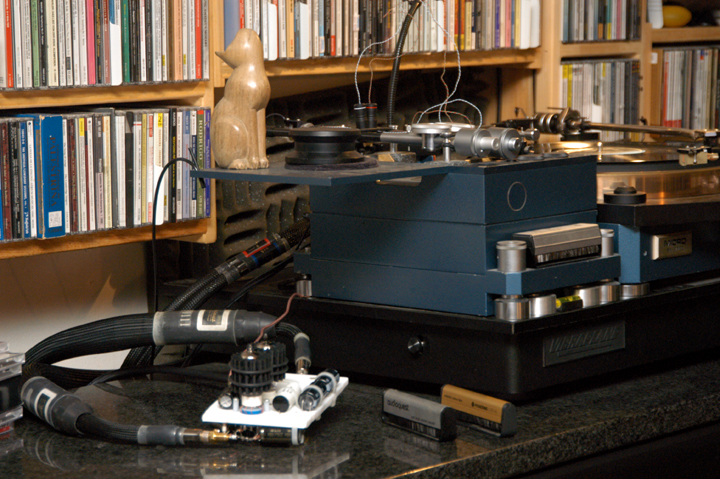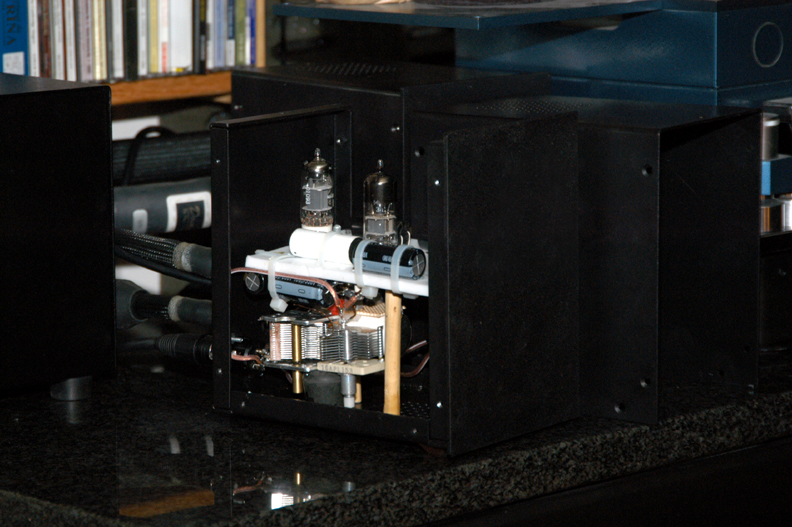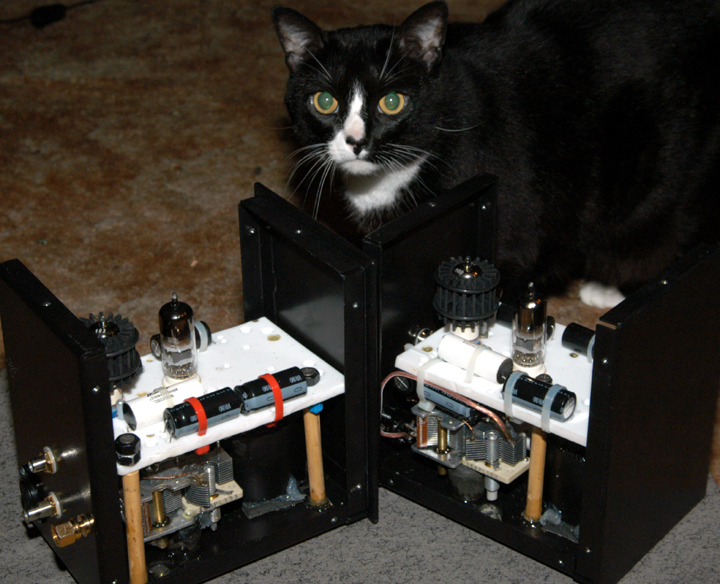|
Posted by Romy the Cat on
05-31-2004
|
usa buy abortion pill abortion pill online usa mixing xanax and weed mixing lexapro and weed redirect Here we go: another yell of a disturbed feline.... How come that after years and years of analog glory, decadence and renaissance the audio industry still has no seriously performing RIAA phonocorrectors. I would not even go to MC correctors or to the mystery world of magnetics but I would ask just about 5mV phonocorrector: how come that whatever is available is so poorly performs and how come that the phonocorrectors actually the weakest element of our analog systems? Rgs,
Romy The Cat
|
|
|
|
Posted by Romy the Cat on
08-23-2004
|
naltrexone where to buy naltrexone buy online canada read lexapro weed lexapro and weed reddit link Hm, I kind of did not have time to continue this thread, probably I will. My initial idea was to publish my observation about all commercial and none-commercial phonocorrectors I have heard and to describe their problems. Perhaps I will return to it another day. For a time being here is a current runner for an Absolute Ultimate Phonocorrector. It is 2 tube stages ~ 64dB gain and it runs MC needle performing the RIAA duty. Did I mention that this thing has no auditable noise… with 108dB sensitive speakers and 10W power?!!!! Currently this corrector is still under testing including the testing with the SU2 step-up transformer. The initial results are quite intriguing and VERY promising. 
|
|
|
|
Posted by Romy the Cat on
08-24-2004
|
|
Since yesterday when I made above posted announcement I’ve got a number emails asking what the hell it is, what topology and what tubes were used. The phonocorrector uses two tubes and a proprietary “patent pending” Electron Intensification Interface. This Interface consists of radioactive particles that boosts amplitude of the signal in the tubes. Until the research about the sonic attributed of the phonocorrector be over the Electron Intensification Interface will be a deep classified technology. :-)
The caT
|
|
|
|
Posted by guy sergeant on
08-26-2004
|
|
sounds like marketing bs to me! and I should know. I have to write that stuff sometimes! best regards, Guy
|
|
|
|
Posted by Romy the Cat on
09-06-2004
|
Ok, now it is official: the God does exist in the phonostage world...
<
|
|
|
|
Posted by cv on
09-15-2004
|
benadryl pregnancy nausea benadryl and pregnancy cleft palate redirect Allo Romy, Air core caps? Good man! Are they for trimming or the primary RIAA? The way I see RIAA equalisation, there must be some optimum tradeoff between high R and low C (low value caps are always nice) and low R high C. Why do we want low R? A few of us have been theorising that it's the non-linear capacitance of active devices that kills music (solid state is particularly bad in this respect). Driving them from a lower source resistance should help. Now, how about telling us some more about this deity?
|
|
|
|
Posted by Romy the Cat on
09-15-2004
|
cheap abortion clinics in memphis tn cheap abortion clinics read CV, I am sorry for this mischievous teasing but at this point I would like to leave it as it: as the mischievous teasing. The entire project is not over yet: we still evaluating some optimum EQ aspects and screen supplies to make this phonostage being THE absolute statement phonostage (hate to say cliché that I heard them all but I did). However, even with the outcome “as is”, the preliminary results are quite impressive: 64dB gain with only two stages with no noise (I do not go into numbers but it is quieter then same of my –88dB signal/noise phonocorrectors). Some merely sonic qualities, and particularly when we introduce to this baby the air caps, made this phonostage insultingly good. Sure, with high impedance transmission lines have no R-termination and the dielectric of caps IS THE terminator, therefore in this scenario the air caps work extra-distinctively beneficial. I am not particularly good and have interest in theories and no one knows how those theories relate to the auditable results but I feel that something we do correct in here, at least we are on a beneficial direction. Stand by, if we end up with the result that I pursue (we are not there yet) then I will make an announcement that the game is over. Rgs,
Romy the Cat
|
|
|
|
Posted by Brian Clark on
10-02-2004
|
Hello Romy
Looks like you may be about to set us off salvaging smoke alarms (like that boy scout a few years back) ;o)
An idea that I haven't seen explored yet for low level stages is the use of Peltier Effect heat pumps to cool the valves. As far as I know this technique for reducing intrinsic noise has only been exploited by Sony in their top line C800G capacitor mic. Do you know anyone who has tried this in a phono amp?
Regards
Brian.
|
|
|
|
Posted by Romy the Cat on
10-02-2004
|
buy low dose naltrexone naltrexone buy online canada website Brian, I really do not know. Under no circumstance I would like to send a message that I have any evolved knowledge in electronics and able to assess a topology or a principle without having even slightest idea what the principle was all about. I have some extended exposure to speakers design (the subject where I could be quite confident) but I was lucky enough do not develop any knowledge in electronics, as always somebody was around who facilitated what I needed. I never was so lucky with phonostages. Whatever I have seen available commercially or otherwise was not good. So, I made myself to learn how to build phonostages. I made 4 phonocorrectors up to now. This last version is the best so far but the ceremony of learning what this corrector does and how to get out of it what it might do is still going on… Rgs,
Romy the Cat
|
|
|
|
Posted by Brian Clark on
10-03-2004
|
buy abortion pill abortion pill online buy
I am in a similar situation although not as far along as you since my "phonocorrector" experiments are yet to start. I in fact have the same valve types lined up so when I discovered your site yesterday there was a strong assonance!
The Peltier Effect heat pump is a simple small semiconductor device that efficiently transfers heat from one surface to another when connected to a power source. Sony use one in their C800G microphone to keep the 6AU6 valve cool with the object of significantly lowering its noise. I strikes me that it could be a useful technique to employ in MC stages. It can be added to an existing circuit simply by wrapping the valve(s) in copper foil with one side of the heat pump in intimate contact with the foil and the other side attached to a heat sink. Current to power the pump could then be tapped from the DC heater supply, taking care to get the polarity correct!
It's just an idea floated like a toy balloon, to be played with or popped (like your Electron Intensification Interface). I've got one of these Peltier things on the way so I will be able to experiment. It didn't cost me much more than 10 dollars. If I detect any worthwhile improvement in sound I will report.
BTW I am no way an electronic expert, just a bumbling amateur. A not very bright rat in a maze.
Wary of cats ;o)
Best wishes
Brian.
|
|
|
|
Posted by Romy the Cat on
10-03-2004
|
|
Brain, C’mon, I was kidding about the “Electron Intensification Interface”! There is nothing in this phonocorrector then a correct selection of tubes, thier proper (well almost proper) use and selection of the specific topological decisions that sold-like produce more “interesting” result. If you lined up the same valve types than I may share with you some usability options that you might find useful. The 7721 is a spectacular output tube in this application. Probably the mostly available are Siemens-made 3DA in Rohre boxes and they are one of the best sounding 7721 as well. The old Siemens 7721 (in none Rohre boxes and with small Siemens printing) was actually made by Telefunken and you will find that in many instances the Telefunken tubes will be sitting inside the Siemens boxes and wise versa. The constriction is very much identical and they sound indistinguishable. Although the old Siemens/Telefunken tubes look sexy and hard to get but I do not detect that they sound more interesting then the Rohre-Siemens (I call them New Siemens but only because the Rohre boxes looks are colored and look fresher. In fact, the Rohre-Siemens tubes are 40 years old as well or something like this…) With 7788/ E810F you have more variety and way more different result. Here are many 7788 out there. Here are some 7788 that I have tried: 1) RCA’s 7788 – kind of strange tube. It sounds abrasive and mean, sometime even rough.
2) Mallard’s 7788 – there are different versions of them, different printings but they all have similar constriction. Mallard 7788 have the strongest among any other tubes bass, sometime is unbearably strong. It has slightly rolled off the HF and some kind of notchy midrange. When I was listing the Mallard 7788 (and I have a half dozen of them to select from) I fell that I am at CES show staying at the door of someone’s room…However, the Mallard 7788 are dead quiet.
3) Philips’ 7788 – they are OK but the do not have that sense of nobility and lush that the best 7788 have. It is possible that the Philips that I trued should be burned longer…
4) Amperex 7788 – very good tubes with practically no microphoniks. The USA PQ production with yellow printing still might have some VERY minute noise but the Holland production with white bold printing (Premium Quality) are insultingly quiet. You can actually tap the operating tubes with volume all the way up and you might not hear anything from loudspeakers. Sonically the Amperex 7788 are excellent, US or Holland made, and if you used then they you might not need even to shock-mount them.
5) Siemens/Telefunken 7788 – they are the same production as well. They are also are fantastically sounding 7788. I for a while felt that Siemens/Telefunken 7788 have no advantages over Amperex 7788 but very recently I took a pair of Telefunken 7788 and burned-in it with a signal for on my other phonocorrector. As the result I found that I prefer the Telefunken 7788 to Amperex. Well-burned Telefunken has less zippy and hi-fiish HF and more fascinating mid-range, way way way way more fascinating! The Siemens/Telefunken 7788 are more microphonik then any others :-( and it will require some precautions to use them. However, it dose worth it.
6) DuMont 7788 – very good tube but it dose not let it go… It is slightly uptight and tense; perhaps I need to let them to burn longer….
7) G.E.C – very strange tubes. Despite of reputation they were probably the worst that I heard. However, I have juts one pair of them and they were used. Perhaps I have existed pair of them. In my tester they do look quite weak…
8) I have a few more 7788 made by no-big name manufacturers: Penniack, Gollo and so on but they do not sound well-enough to memories the manufacturers names… I hope you find my little run over those high transconductance tubes useful. I currently run Telefunken 7788 in front. It sits in amortization sockets and wrapped into a grounded cupper jacket. The socket in mounted within the ¼ Teflon board. The board sits on the wooden stand-offs inside 4mm still box. The box is loaded with lead shots sealed in epoxy bath. With all those precautions the noise-wise it is quite phenomenal even with high-microphonik Telefunken tubes. In order to begin to hear any HF nose from my horn I need to add 18dB to my preamp to my normal listening level. There is no LF or any another noises. BTW, even when I add 18dB on my preamp stick my head onto the horn and listen the hiss then the Telefunken has the more pleasant and none-annoying hiss among all, probably with a very close following by the Amperex… Rgs,
The Cat
|
|
|
|
Posted by Brian Clark on
10-03-2004
|
order abortion pill online usa abortion pill over the counter in usa symbicort generic name symbicort inhaler uk  Romy the Cat wrote: Romy the Cat wrote: | | <p>Brain,</p> <p>C’mon, I was kidding about the “Electron Intensification Interface”!</p> |
|
Ah, really? So you were just winding us up! Now there's a surprise ;o)
I was amassing a nice little stockpile of americum-241 too...
Thanks for your impressions on the valve varieties. I've got just the one pair of selected and closely matched Mullard E810F, marked "Foreign Made" so almost certainly Philips. For D3a I have a couple of Rohre-Siemens and a couple of still-sealed-in-box Telefunkens. Everybody who has used this baby thinks very highly of it.
Thorsten Loesch has sketched me 2 or 3 possible circuits and given me a short tutorial on pentode lore.
Just got to finish off one or two tasks then I can concentrate on my "korrektor". In the meantime, I will continue to keep my eyes and ears open for implementation ideas.
Brian.
|
|
|
|
Posted by Romy the Cat on
10-03-2004
|
|
BTW, Thorsten had an LCR corrector around 7788-7788T. I made in past and it was slightly tacky but still quite good…
|
|
|
|
Posted by Paul Scearce on
10-03-2004
|
I haven't heard of these tubes before, but a search of the data showed some pretty impressive specs. Are you using the input tube near the recommended current of 36ma. I've seen designs based on high gm tubes running at much lower current than the tube was designed for. This lowers the gm to the point that I wonder what was the point of using a high gm tube in the first place?
I've built a phonostage using pentodes in the past. I liked the sound, but the pentodes' gm were too low for really quiet operation.
Paul
|
|
|
|
Posted by cv on
10-03-2004
|
|
Hmmm - the whole LCR thing, I don't like the idea. I'll admit to having no experience of it, but in engineering terms, it just gives you a constant impedance filter. The EQ is still done by caps essentially, far as I can tell. I see the whole setup as inferior to a low Z split RC network with top quality caps (look at the size of the required caps in the 600 ohm LCR for instance). Ok, so as the tubes age, the constant impedance is nice, but there are ways around that with other schemes. Now, an LR network is another matter... Stevens-Billington have now released a 10k version - I say, get the inductors (which must have been quite carefully optimised to maintain a constant L with frequency) and use them in an LR network... As for high Gm, check out the WE416 and the 7768: http://hereford.ampr.org/cgi-bin/tube?tube=7768 The thing to watch with triode input stages (if not cascoded) is that they have a high input capacitance. Not a problem with MC cartridges, but if you are driving them from a transformer, it might be. Just a few random thoughts for yous there.
|
|
|
|
Posted by Brian Clark on
10-03-2004
|
When I was in discussion with Thorsten I actually had the low gm Telefunken EF 804S in mind. This was a valve specially developed for their studio microphone preamplifiers, designed to have minimum self noise so probably the best thermionic amplifying device ever made for low level audio circuits. Unfortunately they are rare and consequently expensive. The very similar EF806 is almost as good and more common.
So I guess there is more than just gm involved when assessing pentode suitability for sensitive applications.
Brian.
|
|
|
|
Posted by Romy the Cat on
10-03-2004
|
|
Guys, the guy who actually designed the circuitry is hiding somewhere within this site. I hope sometime he will step out of the closet and you will be able to abuse him about the 7788. While he is on a witness protection program I am posting a picture of the corrector (without the PS) before I close it up. The Cat 
|
|
|
|
Posted by Brian Clark on
12-07-2004
|
prozac and alcohol cravings prozac and alcohol hangover
Can you compare and contrast the sonic differences between this high Gm contrivance and your previous EAR 834 variant?
All the World is waiting for the sunrise....
Brian
|
|
|
|
Posted by Romy the Cat on
12-07-2004
|
buy abortion pill where to buy abortion pill in usa blog.zycon.com abortion pill online Yes, the differences and advantages are there and are quite dramatic. However, I would like do not nail them down at this point (I have my own reasons, mostly procedural). I will do it sometimes in future when I have time and when I feel it would be "intellectually completed". The caT
|
|
|
|
Posted by Brian Clark on
12-07-2004
|
benadryl pregnancy safety benadryl and pregnancy second trimester zofran pregnancy 2018 zofran pregnancy category fda go 
Got to do something about mine, the borrowed 834P goes back the end of January...
Brian.
|
|